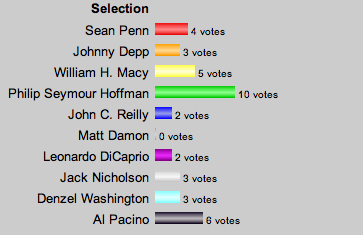Category: Survey
Praxis Theatre survey: identifying a knowledge gap
We asked:
I would go to more independent theatre if . . .
You said: In-depth analysis:
In-depth analysis:
First, the easy stuff. According to these results, big name actors, clear distinctions between companies and comedic theatre all rate low on people’s list of independent theatre expectations.
Cost seems to be a factor among only a minority of respondents: one person wants lower ticket prices, another wants money-back guarantees.
Two people voted for improved marketing materials. (More on this below.)
And another two said they want productions that are more accessible (presumably in regards to a production’s content).
These numbers are hardly conclusive, but as we move toward the higher-rated options, we see clearer definition in the responses and – by design – greater consensus.
The winners:
Given the format of this poll, we’re not sure the most popular answers qualify as “winners”. Let’s, instead, call this “insight”.
The insight:
Four respondents expressed a desire for increased quality in their independent theatre experience. There’s obviously a discussion to be had about what exactly is meant by “quality” and how to achieve it. Maybe we can put this one into our 10 questions rotation: “What do you think is the single greatest barrier to producing quality independent theatre?”
Another four respondents expressed interest in being able to buy tickets for a bunch of shows at one time.
But the most popular response to our survey was from people who feel they need to know more about independent theatre: What is independent theatre? What makes it independent? What are the benefits of independent theatre over mainstream and established theatre? How do I know which shows to go to?
Maybe there’s a link between this knowledge gap and the respondents who felt that marketing materials need to improve.
Obviously, this survey raised many more questions than it answered. But one thing seems clear: the more people we can entice into our theatres, the more work we’ll be able to produce. If there’s a gap between what independent theatre artists are doing and public perceptions of that work, its seems a worthwhile pursuit to examine our communications strategies with renewed vigour.
If anyone has further thoughts on this, let’s continue the discussion.
Praxis Theatre survey: The Streep sweep
We asked:
Who are the two strongest American film actors from this list?
You said: The problem:
The problem:
The wording of our question was as ambiguous as a Quebec separation referendum. Eagle-eyed readers quickly noted that of the possible candidates, three were not, in fact, American. While they do all appear in American films, the ambiguity between American films and American film actors may have skewed our survey’s results. We regret any confusion caused by the wording, and will take due consideration of this into our analysis of said results.
In-depth analysis:
The only surprise here is that neither Oscar-winning actors Julia Roberts nor Hilary Swank were able to muster one measly vote between them. Halle Berry gets a sad single. (We know now that at least one person saw the criminally underrated Catwoman.) Nicole Kidman limps in with two votes. Nobody likes Nicole Kidman? Isn’t she Australian? What’s with being Australian anyway?
For third place, there’s a three-way tie, with vetrans Diane Keaton, Judi (The Dame) Dench and Frances McDormand managing a respectable three votes apiece. Finally, Cate Blanchett makes a strong second place showing with six votes.
The winner:
But the clear, and unsurprising victor of this competition is Meryl Streep. We fucking love Meryl Streep. The Hours, Adaptation, Death Becomes Her. What’s not to love? Meryl. We love you so damn much it hurts.
Praxis Theatre survey: We’re crazy for Hoffman
We asked:
Who are the two strongest film actors from this list?
You said: In-depth analysis:
In-depth analysis:
That’s exactly no love for Matt Damon, and very little love for Hoffman’s sparring partner, John C. Reilly. Pacino has a strong showing with six votes for a tidy second-place finish, while vetran heavyweight Jack Nicholson gets a near-snub with a paltry three votes. DiCaprio and Denzel round out the bottom of the pack with a disappointing two and three votes, respectively.
But the long-running Penn-Depp rivalry was at the heart of this vote’s fiercest battle. In the end, Penn managed a humble 4-3 win. (Amid accusations of widespread ballot stuffing and disenfranchized voters in the Depp camp, this can only be described as a hollow Penn victory.) Finally, our beloved Bill Macy stammers his way into a respectable third-place finish.
The winner:
Clearly, everybody loves Philip Seymour Hoffman. Thanks to all who voted.
Thanks to all who voted.


Recent Comments